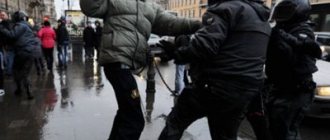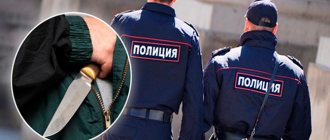The punishment for disobedience to a lawful request of a police officer or obstruction in the performance of official functions is established by the Code of Administrative Offenses of the Russian Federation (Code of Administrative Offenses), and for a criminal attack on a police officer, the article of the Criminal Code of the Russian Federation (Criminal Code).
Illegal actions committed against a representative of law enforcement authorities pose a threat to the state management system and the regular work of internal affairs bodies. Multi-channel free hotline Legal advice on criminal law. Every day from 9.00 to 21.00
Moscow and region: +7 (495) 662-44-36
St. Petersburg: +7 (812) 449-43-40
Basic Concepts
Law enforcement officers, while performing their official duties, are constantly in particular danger; the legislator, in turn, must provide people serving the state with decent protection. The Criminal Code provides for an article for attacking a police officer while on duty, as well as punishment for an attempt on his life. A person who violates a rule of law is held accountable and punished on a general basis.
An article of the Criminal Code defines an attack on a police officer as a particularly serious crime.
An attempt on the life of a police officer or an attack on him is committed with direct intent. The criminal is aware of his actions, and their illegal nature, accordingly, must be punished. Moreover, the actions of the perpetrator are of an impudent nature and are aimed not specifically at a person as an individual, but at a representative of the authorities. By his actions, the attacker disrespects the existing state apparatus. The subject of the violation is a sane person who has reached the age of sixteen. The criminal law considers the purpose of a crime to be obstructing the performance of direct duties by a police officer. This motive is often supplemented by the desire to hide another crime, personal hostility and hooliganism.
The object of the encroachment, according to Article 317 of the Criminal Code of the Russian Federation and the commentary to it, is the work of law enforcement agencies. The objective side of the violation is the use or threat of violence against a law enforcement officer. If there is a murder of a police officer, Article 317 of the Criminal Code of the Russian Federation considers an encroachment on the life of a law enforcement officer as an objective party. If at the time the crime was committed, the victim was not on duty (was not wearing a uniform), then the actions of the criminal are qualified under Article 317 of the Criminal Code of the Russian Federation, but only if this is retaliation for his professional activities. In another situation, the perpetrator will be held liable under Article 105 of the Criminal Code of the Russian Federation - murder.
Article 318 considers an attack on an officer during execution to be completed at the moment of the use of physical or mental violence against the police officer.
Responsibility for assaulting a police officer
A law enforcement officer has a special status as a representative of the government, whose tasks are to ensure order and security in society, as well as to protect the rights of subjects.
Therefore, an attack on his life and health, personal integrity, honor and dignity entails criminal punishment.
Sanctions apply:
- for attempting or committing murder;
- for violent acts.
An article of the code classifies an attack on a police officer during execution as a particularly serious crime.
In addition to the life of the employee, these acts endanger the lives of people close to him, and also violate the mechanism for fulfilling the assigned tasks. How much do they pay for killing a policeman, says Art. 317 of the Criminal Code of the Russian Federation. The offender is punished by imprisonment for a term of twelve to a couple of decades; life imprisonment may also be imposed if there are aggravating circumstances.
Prevention of crimes against police officers
Crime against the management system is under special control. According to the records, attacks on law enforcement officers are quite common. More than ten thousand cases have been recorded since the beginning of this year. Most of them occurred during execution. The situation with crime against employees of competent structures requires active measures for prevention and prevention.
The main directions of prevention are:
- personnel training;
- the issue of employee responsibility for the use of weapons.
Rigid order, thorough investigation, reporting for every shot fired during execution, presumed “future guilt” and sanctions for these actions, which do not contribute to the healthy use of weapons for self-defense, and therefore the practical side of responsibility for the use of weapons needs adjustments.
What is beating
When considering beating from the point of view of criminal law, one should focus on the characteristics and elements of the crime. The object of beating is the personal inviolability of a person from physical and psychological influence of a negative nature
These rights are enshrined in the fundamental document - the Constitution of the Russian Federation.
The objective side of beating cases is considered to be the infliction of physical injuries that cause inconvenience in terms of the victim’s disability. Here we can also talk about moral damage, since mutilation is a way of psychologically influencing the victim.
The corpus delicti consists of two parts:
- Infliction of bodily harm is the active actions of a criminal, characterized by physical blows to the body of the victim. As a result, the other side develops bruises, abrasions, cuts, bruises, deep wounds and other damage to the skin. In the case of beatings, the openness of the damage may not appear. Then you should pay attention to the second component of the crime.
- Intentional act - by exerting physical pressure on the victim, the criminal takes conscious actions. Even if this manifests itself in a state of passion or under the influence of alcoholic intoxication, the perpetrator will face criminal punishment.
3 options to get free help from experienced lawyers
- Online chat - describe the situation to find out from a legal consultant how to solve your problem
- Hotline – (Moscow and region) or 8 800 511 38 27 (Other regions of the Russian Federation)
- Online consultation - help on the page
The subjects of the crime are individuals, and in our case, police officers who are on duty or performing an undercover task.
What can influence the court's decision?
The judge's decision is influenced by a combination of aggravating and mitigating factors. Mitigating circumstances include:
- family composition of the accused (presence of dependents or young children);
- elderly age;
- states affecting the psyche (affect);
- pre-trial conflict resolution through reconciliation of the parties;
- full admission of guilt by the defendant and consideration of the case in a special manner. In this case, the court decision cannot be appealed.
Aggravating circumstances that can increase the severity of the chosen penalty:
- State of drug or alcohol intoxication;
- Use of weapons or auxiliary means during an attack;
- Preliminary agreement;
- A crime based on racial hatred.
Assaulting a police officer is a serious crime that carries serious penalties, up to life in prison or the death penalty. The crime is classified based on the circumstances of the case, the situation and motives for the attack, as well as the harm caused.
| Did not find an answer to your question? Call a lawyer! Moscow: +7 (499) 755-83-41 St. Petersburg: +7 (812) 917-23-31 |
Commentary on Article 318 of the Criminal Code of the Russian Federation
1. The objects of criminal assault are the health and mental integrity of the victim, as well as the normal public activities of government bodies.
2. The victims of this crime may be, according to the note. to Art. 318 an official of a law enforcement agency or another official who has organizational and administrative powers in relation to an unlimited and indefinite number of persons independent of him in service. In addition to the named persons, victims of a crime may be relatives of the mentioned persons (on the concept of close persons, see commentary to Article 317).
3. The objective side of the crime (Part 1) is expressed in the use of violence, not dangerous to life or health, to those named in the comment. article to persons or the threat of violence against them. Violence that is not dangerous to life or health means beating the victim or committing other violent acts that do not entail any harm to his health. The content of the threat can be different, up to the threat of murder, and also vague. The threat of violence must be real, i.e. such that the victim has reason to fear that the threat will be carried out. The ways of expressing a threat can be different: verbally (words), gestures, or in writing.
4. Necessary for qualifying an act as a crime is the use of violence or threat against a representative of the government or his relatives, carried out in connection with the performance of their duties. The concept “in connection with the performance of official duties by a representative of the authorities” covers both the time of violence or the threat of its use during the performance of his official duties by the victim, and the time when they have already been performed. The use of violence or threat of violence not in connection with the performance of duties by an official does not constitute a crime under Art. 318.
5. Part 2 comments. Article is subject to application in cases where violence dangerous to life or health is used against a government official or his relatives. Violence dangerous to life or health should be understood as violence that resulted in the infliction of light, moderate or severe harm to the health of the victim, as well as violence that, although it did not result in the specified harm, however, by its nature at the time of application created a real danger of causing harm to the life or health of these persons. Part 2 only implies physical violence.
6. To qualify the actions of a person expressed in the use of violence or the threat of its use in relation to a representative of the authorities, under Art. 318 it is necessary to establish that the victim performed official duties legally. The use of violence or the threat of violence outside of the performance of official duties by the victim should be qualified under the article of the Criminal Code of the Russian Federation on crimes against the person.
7. The crime is completed (by elements) at the moment of the use of physical or mental violence, regardless of whether the perpetrator succeeded or not in preventing a representative of the authorities from performing his official duties.
8. The subjective side of the crime is characterized by direct intent. Motive and purpose are not constructive elements of the composition, unlike Art. 317, however, they cannot be anything that is not related to the performance by the victim of his official duties.
9. The subject of a criminal offense is a physically sane person who has reached the age of 16.
10. Actions enshrined in part 1 of the comment. Articles are classified by the legislator as crimes of medium gravity, and in Part 2 - as serious crimes.
Violent acts against a law enforcement officer
Violent acts or threats against a police officer (Article 318 of the Criminal Code) are also criminally punishable.
The Code contains a note according to which the victim can be any entity with control and administrative powers, namely:
- Law enforcement officer.
- Controlling authority official.
- Local government representative.
The object of the attack, as in the case of murder, is the work of law enforcement agencies.
The danger to life or health arising from the offense affects the severity of liability. The infliction of such violence must be associated with the legitimate activity of the victim. If, as a result of the investigation, this connection is not discerned, then the act is qualified as robbery under Part 4 of Art. 162 of the Criminal Code.
Qualification problems
Due to the specific nature of the work of police officers, when considering each case of an attack on one of them, investigators systematically face problems of classifying the crime.
Facts, explanatory evidence on behalf of the victim, explaining his actions and the reasons that led to this, are collected by the police. The circumstances of the crime are being studied by employees of the Investigative Committee of the Russian Federation.
A conscientious investigator should consider the following points:
- The merits, professionalism of the victim and the circumstances of the crime.
- Whether the attack was committed by the accused citizen in a state of passion due to a previous clash with government officials or for other reasons not related to his relationship with the police.
- How accurately was the examination carried out to record the injuries of the injured and accused parties?
- Was the police officer's behavior correct and lawful before the attack?
- How impartial will it be to collect facts about the essence and circumstances of the conflict and to pass a sentence on the accused of assault if the case is supervised by a person who is, for example, a close friend of the injured or accused party?
In a number of cases, when minor injuries are inflicted on a police officer and the facts are clarified, somewhat mitigating the offense of the accused party, and, of course, consent on behalf of the injured party, the result of the investigation into the case of an attack on a law enforcement officer may be an apology from the accused to the accused.
In other circumstances, the accused is awarded a fine, forced labor, or a prison term.
Beating of a plainclothes officer
A plainclothes policeman is an officer on duty. The type of clothing does not negate its functions in maintaining law and order in society. This is stated in Art. 12 of the Federal Law “On Police”. Furthermore, in accordance with Art. 13 of the same law, the policeman is obliged to demand that citizens comply with Russian legislation and suppress any crimes. Otherwise, the employee will face disciplinary action.
Thus, if a person in a shirt and jeans presents an ID card from the Ministry of Internal Affairs and states his name and position, any attack on him will be interpreted as violence against an official.
The police are on duty.
How is an assault considered if a police officer attacked himself?
When making arrests, police officers often have to use force. And we are not talking about shooting and the use of special equipment, but about very standard blows, grabs and other techniques that in one way or another can cause harm to the detainee. However, they cannot use force just like that, at will - laws and regulations oblige them to use force only after a warning, and they themselves must not be dangerous to the life of the victim.
The police officer is also required to report in writing on all violent measures applied to the detainee. Therefore, if the arrest was legal, the policeman acted according to instructions, and after that a report was drawn up, then any defense will be recognized as a crime. But if a report was not drawn up, the police officer did not follow the rules, or caused damage without reason, then his actions will be considered illegal. The degree of guilt of the defender, again, depends on how well the conditions of detention were met and how the defense took place.
Investigation of the case
To punish an attacker for assaulting a police officer, all stages of the procedure must be followed. Crimes that result in the death of a police officer are investigated especially carefully. After a beating, the victim must:
- go to a medical facility and remove the beatings;
- to write an application;
- collect evidence.
To investigate, it is necessary to study the crime scene and record all important details. That is, it is necessary to perform standard investigative actions
In addition, you should pay attention to the following circumstances:
- The fact of planning to commit a crime. That is, whether the criminal was preparing to beat a policeman, was looking for means and a place for this.
- Is the attack a consequence of the police officer performing his duties? This could be revenge, intimidation, etc.
- Has the victim received any threats?
- Finding out the motives for the attack that are not related to the professional activities of the victim.
- Determining the reasons why the law enforcement officer did not defend himself.
In practice, a police officer can use, for example, weapons for self-defense only in special cases. Legislative deficiencies affecting the large number of reports and liability for exceeding self-defense measures often lead to the death of law enforcement officials.
https://youtube.com/watch?v=Z78M38KoXTI%3Ffeature%3Doembed
Lawful use of force against an employee
According to Art. 37 of the Criminal Procedure Code of the Russian Federation, there is an admissibility of self-defense in a situation of an attack on the life, health and legitimate interests of a citizen. At the same time, the text of the article does not indicate the position or profession of the attacker. However, the Supreme Court of the Russian Federation in 2012 prohibited residents of Russia from offering any resistance to any actions of police officers, even if the latter unlawfully use physical force associated with causing harm to the life, health or property of a citizen.
Thus, any resistance to the police is taken beyond the scope of necessary self-defense and entails liability under Art. 318 Code of Criminal Procedure of the Russian Federation. In turn, a police officer who kills a citizen during arrest is held accountable under Art. 108 of the Criminal Code for exceeding self-defense.
Basic Concepts
Law enforcement officers, while performing their official duties, are constantly in particular danger; the legislator, in turn, must provide people serving the state with decent protection. The Criminal Code provides for an article for attacking a police officer while on duty, as well as punishment for an attempt on his life. A person who violates a rule of law is held accountable and punished on a general basis.
An article of the Criminal Code defines an attack on a police officer as a particularly serious crime.
An attempt on the life of a police officer or an attack on him is committed with direct intent. The criminal is aware of his actions, and their illegal nature, accordingly, must be punished. Moreover, the actions of the perpetrator are of an impudent nature and are aimed not specifically at a person as an individual, but at a representative of the authorities. By his actions, the attacker disrespects the existing state apparatus. The subject of the violation is a sane person who has reached the age of sixteen. The criminal law considers the purpose of a crime to be obstructing the performance of direct duties by a police officer. This motive is often supplemented by the desire to hide another crime, personal hostility and hooliganism.
The object of the encroachment, according to Article 317 of the Criminal Code of the Russian Federation and the commentary to it, is the work of law enforcement agencies. The objective side of the violation is the use or threat of violence against a law enforcement officer. If there is a murder of a police officer, Article 317 of the Criminal Code of the Russian Federation considers an encroachment on the life of a law enforcement officer as an objective party. If at the time the crime was committed, the victim was not on duty (was not wearing a uniform), then the actions of the criminal are qualified under Article 317 of the Criminal Code of the Russian Federation, but only if this is retaliation for his professional activities. In another situation, the perpetrator will be held liable under Article 105 of the Criminal Code of the Russian Federation - murder.
Article 318 considers an attack on an officer during execution to be completed at the moment of the use of physical or mental violence against the police officer.
Investigation of cases of attack on police officers
Thorough investigation of cases and bringing to punishment those responsible for attacks on law enforcement officers is one of the trends in the prevention of crimes of this nature.
It is important to punish not only the direct perpetrators, but also all subjects of the criminal chain, which in practice is quite difficult. Cases in this category are initiated if there is accurate information about a criminal act. The employee, with his report, informs about the incident to persons whose authority includes accepting such messages.
In the event of a murder, the information necessary to initiate a case can be obtained by examining the scene of the crime. At this stage, it is important to identify all the details indicating that the act was directed against a government official or his relatives, and not just a person.
These points are recorded in the protocol of the inspection of the scene of the event, if it is carried out before the initiation of a case (within the framework of an already initiated case, among the first investigative measures).
When putting forward versions of what happened, it is necessary to fully study the following points:
- Was the act planned, the level of its preparedness, the place where it was committed, the means and instruments and other features.
- Examine in detail the nature of the victim’s competence and professional activities, in particular, actions related to the implementation of administrative and power functions, recently conducted inspections and other control activities, a list of criminal cases that were in the victim’s work.
- Whether or not there have been previous threats or conflict situations involving the victim or his relatives.
- Studying the reasons for the victim’s failure to take self-defense measures, especially if the murder of a police officer is being investigated, Article 317 of the Criminal Code of the Russian Federation.
- A thorough analysis of the victim’s personality, living conditions, and behavior in order to identify the motives for the crime that are not related to official activities.
In the course of proceedings in cases of the crimes under consideration, investigative measures are carried out as provided for by the Code of Criminal Procedure, taking into account the fact that the victim must contribute to the investigation of criminal cases.






